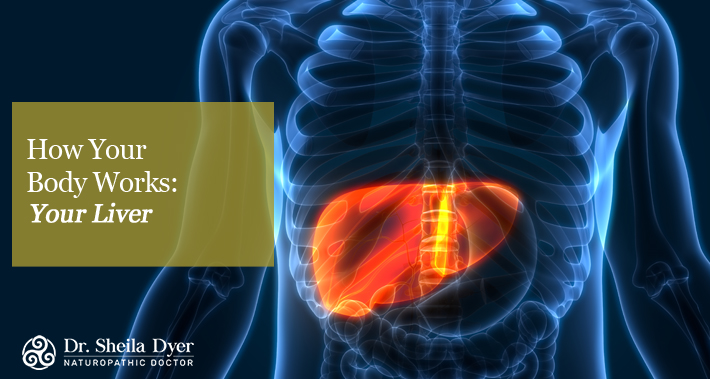
We can hear our hearts beating and feel our lungs pumping, but what about our liver?
Most of us don’t give much thought to this organ, but it plays an important role in our overall health.
But what exactly does the liver do, and how can you keep it healthy?
I’m Dr. Sheila Dyer, ND, and today I’d like to take a closer look at your liver.
What Is Your Liver?
Your liver is one of the most important organs in your body.
It’s half moon shaped, with two lobes or sections.
The left lobe sits just above your stomach, and the right lobe above your small intestine.
Your liver is the largest solid organ in your body, weighing about three pounds, or 1.4 kilograms.
What Does Your Liver Do?
The liver is a major player in the healthy function of your body.
The liver performs metabolic functions, which include:
- Breaking down and converting substances in your body
- Removing toxins from your bloodstream
- Converting glucose into glycogen, to be stored for later use
- Converting stored glycogen back into glucose for use
Your liver receives nutrient filled blood from your digestive system via the hepatic portal vein.
From there, specialized cells known as hepatocytes sort and filter this blood.
These cells determine which nutrients need to be stored, processed, or returned to your bloodstream and what should be passed through your urine.
The liver also plays an important role in metabolizing fats.
It stores fat soluble vitamins, like vitamin A, vitamin D, vitamin E, and vitamin K.
It does this by creating a substance called bile, which is important for the breakdown and absorption of fat in the body.
The liver also works to break down proteins, creating a byproduct called ammonia in the process.
Ammonia is toxic if there’s too much in your body, so your liver converts it into urea.
From there, your kidneys filter it out of your blood, and into your urine.
That’s why your urine smells like… that.
Your hardworking liver has many other jobs as well.
These include:
- Removing alcohol from your bloodstream
- Helping to break down old or damaged red blood cells
- Playing a role in supporting your immune system
- And more
So as you can see, your liver is pretty important.
Common Liver Conditions
Just like any organ, there are some issues that can affect your liver.
Let’s take a closer look at some of the more common ones.
1. Hepatitis A
The term “hepatitis” originally referred to liver inflammation caused by a viral infection.
But we’ve since learned there are other causes of liver inflammation, hence all the letters.
Hepatitis A is liver inflammation caused by toxins, infection, or alcohol misuse.
It’s most common in places with poor sanitation or contaminated drinking water.
Most people recover from hepatitis A without any long lasting complications or liver damage.
There’s a vaccine available for hepatitis A.
2. Hepatitis B
Hepatitis B is liver inflammation spread through sexual contact, sharing needles or accidental needle sticks with a contaminated needle.
Hepatitis B infections can be short or long term.
The younger you are when you acquire hepatitis B, the greater your risk of developing it long term.
This disease is serious, with complications that include cancer and liver failure.
Vaccines are available to protect against hepatitis B as well.
3. Hepatitis C
Hepatitis C is usually spread by contact with blood contaminated with the Hepatitis C virus.
This can occur via shared needles used to inject drugs, or through tattoo needles.
It can also spread via sexual contact, but this is less common.
Hepatitis C infections can be acute or chronic.
It’s important to note, though, that most acute hepatitis C infections will become chronic.
The inflammation caused by this condition can lead to liver cancer, cirrhosis and liver failure.
4. Autoimmune Hepatitis
Autoimmune hepatitis occurs when the body’s immune system attacks otherwise healthy liver cells and tissue.
This disease can cause cirrhosis and liver damage.
RELATED: Toronto Naturopathic Clinic For Autoimmune Conditions
5. Nonalcoholic Fatty Liver Disease (NAFLD)
Nonalcoholic Fatty Liver Disease (NAFLD) refers to a number of conditions that cause excess fat to build up in the liver.
This excess fat can cause inflammation, which in turn damages the liver.
6. Cirrhosis
Cirrhosis is caused by a number of different issues, including chronic hepatitis, Wilson’s disease, or excessive alcohol use over a long period of time.
In a person with cirrhosis, healthy liver tissue is replaced with scar tissue, negatively impacting liver function.
How Do You Know If You Have A Liver Issue?
While your liver is an important organ, it’s also one of the least well understood.
It doesn’t have pain receptors, so liver issues cannot be felt directly, like stomach or joint pain.
Instead, problems with the liver can cause pain in the surrounding tissues.
This can include your abdomen, back, or shoulders.
Other signs and symptoms of liver problems can include:
- Chronic fatigue
- Yellow skin or eyes (jaundice)
- Dark coloured urine
- Swelling in your ankles or legs
- Itchy skin
- Loss of appetite
RELATED: Naturopathic Clinic For Skin And Hair In Toronto
If you recognize any of these symptoms, it could be a sign of liver disease – book an appointment with me and we’ll get to the bottom of your symptoms.
Can You Survive Without Your Liver?
Your liver has an amazing ability to regenerate itself.
When part of your liver is injured or removed, it can grow back.
In fact, if you have two thirds of your liver removed, it can grow back within about a week, studies show.
It’s the only visceral organ that can do this.
Because of this, you can actually donate your liver while you’re still alive.
Here’s how it works – you donate part of your liver, which would be transplanted into the person who needs it.
From there, the portion of your liver still in your body will regrow, and so will the part that you donated.
But without a liver, you can’t survive.

Natural Solutions For A Healthy Liver
There are a number of lifestyle and diet changes that can help to keep your liver healthy and happy.
Maintaining a healthy weight, limiting alcohol consumption and keeping physically active can all contribute to a healthy liver.
Using barrier methods such as condoms when having sex can help reduce the risk of contracting hepatitis B or C.
The nutrients that we receive from what we eat are also essential for our liver’s proper function.
There are a number of foods which can contribute to healthy liver function, including:
- Healthy fats, such as nuts, seeds, olive oil and fatty fish
- Dark green leafy vegetables
- Blueberries and cranberries
- Grapes
- Grapefruit
Studies have also shown that drinking tea can have a positive effect on liver enzymes in people with nonalcoholic fatty liver disease.
Coffee can also help to protect the liver from cirrhosis, and lower inflammation in the body.
Antioxidant rich foods can also help to support healthy liver function.
That includes coffee and tea, but it also includes:
- Vitamin E rich foods like tomatoes, broccoli, and sunflower seeds
- Vitamin C rich foods like citrus fruits, bell peppers, and potatoes
- Vitamin A rich foods like leafy green vegetables
- Curcumin, the active ingredient in turmeric
- And many others
Get these and other whole foods organic when you can.
This makes sure you have significantly fewer pesticides on your food, which can help to reduce the burden on your liver and keep it functioning optimally.
Book Your Appointment With Dr. Sheila Dyer, ND, Today
Your liver is an incredible organ that works hard for you.
If you’re concerned about your liver or one of your body’s many other moving parts, I can help.
Book your appointment with me, Dr. Sheila Dyer, ND, today.
If you have questions about naturopathic medicine, or would like to start with your first consultation, contact me, and let’s book an appointment.
Dr. Sheila Dyer, ND1080 Dovercourt Rd,
Toronto, ON M6H 2X8
(416) 554-5135
► https://g.page/DrSheilaDyerNd
Dr. Sheila Dyer is a Naturopathic Doctor and a practicing registered nurse offering holistic healthcare with a scientific focus